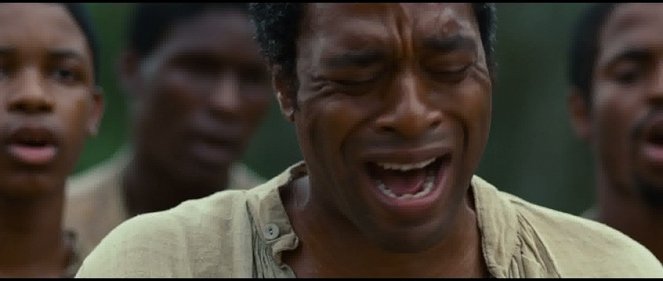Directed by:
Steve McQueenScreenplay:
John RidleyCinematography:
Sean BobbittComposer:
Hans ZimmerCast:
Chiwetel Ejiofor, Michael Fassbender, Lupita Nyong'o, Benedict Cumberbatch, Sarah Paulson, Paul Dano, Brad Pitt, Paul Giamatti, Michael Kenneth Williams (more)VOD (4)
Plots(1)
In the pre-Civil War United States, Solomon Northup (Chiwetel Ejiofor), a free black man from upstate New York, is abducted and sold into slavery. Facing cruelty as well as unexpected kindnesses, Solomon struggles not only to stay alive, but to retain his dignity. In the twelfth year of his unforgettable odyssey, Solomon's chance meeting with a Canadian abolitionist (Brad Pitt) forever alters his life. 12 Years A Slave is based on an incredible true story of one man's fight for survival and freedom. (Entertainment One)
(more)Videos (36)
Reviews (16)
I sort of see parallels with today’s society in this and not an anti-racist fairytale with a happy ending, which they obviously seemed to want. McQueen has disappointed me for the first time, probably because he couldn’t be sufficiently detached from the topic and he forgot to spice it up with something. These torturous 12 years seem fairly relaxed and Platt doesn’t experience proper slavery until he’s with Fassbender, who is cutely eccentric and interprets the Word of the Lord in his own special way. And eventually he alone really deals out punishment. Chiwetel Ejiofor (how the heck do you pronounce that?) acts well, but he honestly doesn’t have that much to do and the nomination for an Oscar is a little bizarre. The concept of time passing was poorly intimated, it’s hard to tell how long he was where and if it wasn’t for the title and the granddaughter, it could have easily been like four years. Lifelessly filmed and if it weren’t for Fassbender, I just don’t know. Nothing exceptional, but it’s watchable. P.S.: Hans Zimmer sometimes shines, but the music is mostly pretty ordinary and the gospel overkill is just awful. I said dance! Come on! Get goin’, Platt!
()
This was supposed to be a magnum opus with everything, but instead there came false grandiosity, where the plot only describes larger or smaller circles. I'm somewhat regretful given Steve McQueen's obvious engagement, but neither the raw scenes nor Michael Fassbender's dominating performance help him on his way to the audience this time. This is partly due to the fact that Hans Zimmer' music is overly sentimental and therefore incongruous, partly it is the feeling of futility that the casting gave forth excellent performances that go nowhere (Paul Giamatti, Benedict Cumberbatch). But worst of all – thematically, there is absolutely nothing extra. The sorrowful looking (and it must be said, significantly underplayed) Chiwetel Ejiofor is dragged by destiny, encounters slimy, treacherous, or weak white men, and sympathizes with suffering black people. And that, more or less, is where it ends. In fragments of the plot or dialogue, it occasionally functions, but as a whole, it is remarkably transparent.
()
The film is shot decently, with exceptional care, and it can be seen that if not the director himself, then the producer was definitely counting on a festival award - after all, the subject matter is the sort where the creators claim a film award in advance. However, my 4 stars are rather meant as my appreciation of the formal qualities rather than an expression of emotional solidarity with the film. It has a strong story and theme, and yet I watched a film that didn't touch me emotionally in any way, and what's more, it didn't surprise me at all. It has exactly what one would expect, and while Hunger from the workshop of Steve McQueen, which is rated worse on FilmBooster, got under my skin and made me think about the film and come back to it in memories, in the case of 12 Years a Slave, I feel like I just ticked off having seen it. Overall impression: 70%. Sometimes the term film academism appears in film comments - I would say that it fits quite well with this film.
()
A drama with two storylines, an omniscient narrator and clearly defined objective and solidly cohesive dramaturgy? Dialogue handled predominantly with the shot/countershot technique? Softening of violent moments though precise editing? Not this time. Though 12 Years a Slave has been reproached for its conservative classicism, what McQueen adopts from the classic Hollywood style is especially an interest in the human body, which could also be described as an expression of his creative signature. Faithfulness to the original book even at the cost of breaking up the narrative into a number of episodes that are not firmly interconnected, and when one isn’t conditioned by another, was one of the many wise filmmaking choices that resulted in a lacerating cinematic account of the atrocities that whites perpetrated against a race that they considered to be inferior. McQueen’s mastery consists in the way he manages to avoid twisting historical facts in order for them to fit into the bigger story (like Spielberg in Amistad and Lincoln), while providing an extremely intense viewing experience. Thanks to the suppression of dramatic tension and the numerous static shots, the film seems like a series of consecutively arranged images that slowly burrow into the viewer’s memory thanks to the spiral repetition of certain situations and shot compositions. True to his background as a video artist, McQueen does not recount history or turn it into a drama, but instead lets it come alive as if it were happening right now. The protagonist’s hardships are therefore not viewed from the outside. We experience them together with Solomon, through his body, eyes and ears. Throughout the film, we know just as little as he does (for example, we never see the whole ship by which he is transported to New Orleans) and, despite the telling title of the film, we have just as few reasons to believe that he can emerge victorious from the uneven struggle for his own identity. The reduction of life to mere survival and the transformation of a person into an animal (or rather property) are highlighted by the loss of consciousness of spatial and temporal contexts, as we are not informed about the time and place of the events, with the exception of the introduction. In combination with the complete lack of moments providing relief, the abundance of unpleasant shots and images, from which the camera never turns away (the unpleasant shots are also the longest) makes 12 Years a Slave one of the most audacious films of last year. 90%
()
I was afraid of self-poignant historical frescoes about a cohesive black community and ugly southern slaveholders, but I got a surprisingly bright and complex story of a man who will perhaps too quickly acquire a forced identity and live his 12 years not in chains, but in separation (from his family, but also from the "community" of Negro slaves). Like Tarantino a year ago, McQueen ticks off too-simple boxes and pleasing catharsis. Although the screenplay sometimes casts unnecessarily large words under his feet, but the narrative through images, the emphasis on ambiguous "looking" into the face of the protagonist and his companions, and the inner stratification of individual Lords keep him close to his central theme - lack of freedom, which is not the result of specific enslavement, but rather existence itself. In the end, we can come to the surprising discovery that more than anything, 12 Years a Slave is a film about the acceptance of someone else's identity and the traumatic loss of oneself. Hence the often mentioned passivity of the main character, which is in fact an essential part of his choice to survive even through the greatest compromises. More like Frantz Fanon than Steven Spielberg, the film is masterful and strong in the best moments, despite its imbalance. In the others, perhaps safely approaching conventions, it is still at least fascinating and worth thinking about. [85%]
()
Gallery (71)
Photo © Fox Searchlight Pictures



Ads